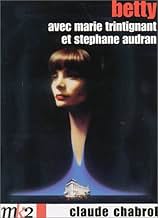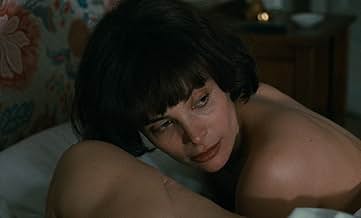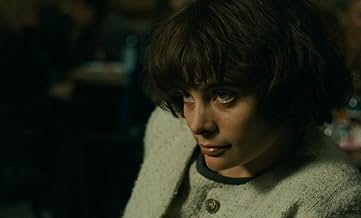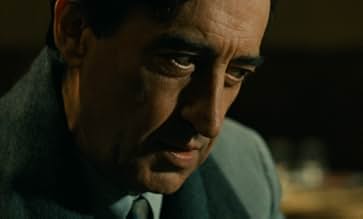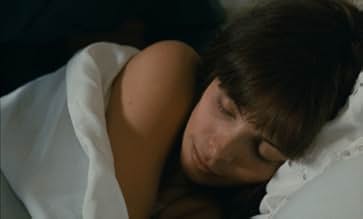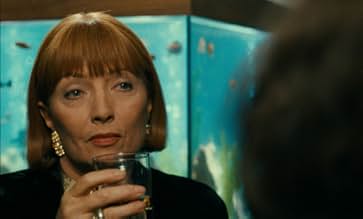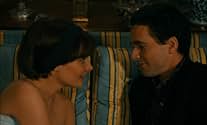Agrega una trama en tu idiomaA drunken self-destructive woman called Betty wanders through bars and meets a man that drives her to a restaurant outside Paris called Le Trou (The Hole). She meets the middle-aged alcoholi... Leer todoA drunken self-destructive woman called Betty wanders through bars and meets a man that drives her to a restaurant outside Paris called Le Trou (The Hole). She meets the middle-aged alcoholic Laure from Lyon, who is the lover of the Le Trou's owner Mario. Laure decides to take ca... Leer todoA drunken self-destructive woman called Betty wanders through bars and meets a man that drives her to a restaurant outside Paris called Le Trou (The Hole). She meets the middle-aged alcoholic Laure from Lyon, who is the lover of the Le Trou's owner Mario. Laure decides to take care of Betty and brings her to the room next-door in her hotel. Along the days, Betty tells... Leer todo
- Dirección
- Guionistas
- Elenco
- Premios
- 1 premio ganado en total
Opiniones destacadas
Cinematography is part of the story. Like at Berri's "Tchao pantin" (1983), Bernard Zitzermann's work enhances the story at the right time, and then releases its grip on us. When it pours rain and Betty is carried like merchandise from one tramp to another, you feel wet and desolate. The song "Je voulais te dire que je t'attends" is very effective too, I felt bad just by comparing the moving lyrics with what we were seeing, the road to nowhere.
Simenon is a love/ hate affair, I find it hard to be objective with him. I can't speak about his novels, but I can't say I like watching his cinema adaptations, they make me feel bad about everything in life after having watched them. And yet, I though they well made, atmospheric, immersing, in a sort of "descent to hell" way. I mean, it's like reading Dostoievsky but less melodramatic, and with way more sex & the facade of love as subjects.
This is a film about women. Marie Trintignat of course IS this movie. Frail, elegant, beautiful, but enigmatic, always following her own ways, in her private world where no one reaches her, it's hard to love her if one sees her objectively, but is nevertheless an alluring character. Reading her bio on IMDb is heavily interesting, it's like Claude C understood her personality, almost her "destiny", encapsulated it and gave it to us on celluloid, thus, making it last sort of forever.
Laure, on the contrary, while no angel, maybe sees in Betty some sort of projection of herself, some "lost soul to be saved", or in any case, she mothers Betty, in a non dominating way, firm when she has to, almost too perfect to be real.
Mario and Guy Etamble are characters devoid of soul, will or personality. Guy of course is dominated by the family, even when they made her sign the legal contract, it's "them", not him. Even the sister in law is there :)! So when they have to decide "what to do with her", it's a family affair, in which Guy is only one of the voices. And of course there Madame Etamble seems to be the only dominating force. Again, women are the only source of plot in this story.
A very "French" film in the use of a convoluted plot, frequent flashbacks, "originary scenes" all the time (torrid sex scenes unintended to be seen, but of course finally obvious, unless you think there is always a motif for everything, so ... :)). Psychoanalysis is a commanding force, "manifestly" in the mouth of one of Betty's lovers, the intellectual, spectacled Freud follower, but "latently" in all of this oeuvre.
dbdumonteil's review has probably the best quote on this film, by Marie T., you better read it from his review proper.
Chabrol loves to hate the bourgeoisie, so it's no news they look silly and dumb here. The "bourgeois wealth, rigid roles, invisible servants, funless family in short". Chabrol would probably put the blame of most on them, but we don't have to. Nothing new by now, no big deal, Claude :).
This is a cautionary tale in many ways, but of course you'll have to watch this movie to find out why.
PS: The storyline review by "jhailey@hotmail.com" has spoilers, can't anybody do something about it?
The story begins with Betty on a date with a psychotic ex-doctor and she's becoming drunk VERY fast (I can't recall EVER seeing a character in a movie drink that many drinks so fast). When she awakens she's in the home of an older woman who has rescued her. And, slowly in flashbacks, we see Betty's story about her life--given in bits and pieces interspersed throughout the film. There were two problems with this method: first, it was, at times, pretty confusing following the action, and second, I just found myself not particularly caring about the character. She was a total mess.
It's a shame, as I have really enjoyed several other Claude Chabrol movies--this, unfortunately, isn't one of them. It only scores a 4 because the acting is good--the story sure isn't.
¿Sabías que…?
- TriviaThe last film that director Claude Chabrol and his former spouse Stéphane Audran made together.
- ConexionesFeatured in Antenne 2 - Le journal de 20H: Episode dated 16 February 1992 (1992)
- Bandas sonorasJe Voulais te Dire que je t'Attends
Lyrics by Michel Jonasz and Pierre Grosz
Music by Michel Jonasz
Performed by Michel Jonasz
Selecciones populares
- How long is Betty?Con tecnología de Alexa
Detalles
Taquilla
- Total en EE. UU. y Canadá
- USD 58,099
- Fin de semana de estreno en EE. UU. y Canadá
- USD 5,243
- 22 ago 1993
- Total a nivel mundial
- USD 58,099
- Tiempo de ejecución1 hora 43 minutos
- Mezcla de sonido
- Relación de aspecto
- 1.66 : 1
Contribuir a esta página


